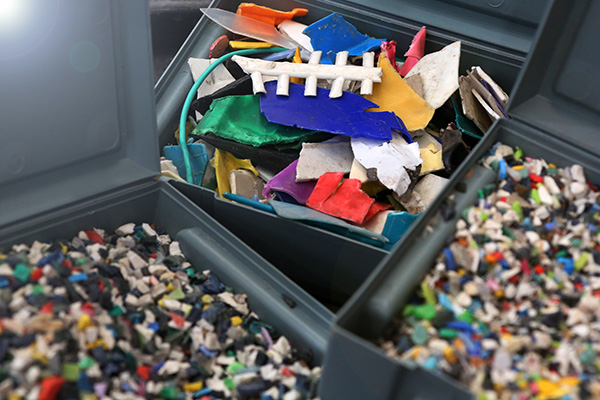Traditionally, bulky municipal plastic waste not selectively collected in Belgium’s Walloon Region was incinerated. Today, the Technopoly Recyclage project is demonstrating the feasibility of recycling this waste stream and converting it to secondary raw materials.
- 24 January 2017
Plastics are used in all aspects of our daily life. At the same time, plastic waste volumes are increasing and plastic recycling has become a major challenge. The Technopoly Recyclage project worked towards the valorisation of municipal plastic waste in order to minimise disposal at the landfill.
Although there are efficient processes for recycling such everyday plastic materials as bottles and other small items, such processes are lacking for bulky and less common plastic items. As a result, most of these items end up in the landfill.
In the Walloon Region of Belgium, the Technopoly Recyclage project has implemented an innovative process for recycling post-consumer rigid plastic waste at the landfill itself. The recycling loop covers selective collection, waste treatment and processing – converting the rigid plastic into valuable secondary raw materials.
From broken chair to energy production
Now that the faded green plastic chair in your yard has finally cracked and given out, what do you do with it? Although it is plastic, it doesn’t fit the requirements to be recycled with the plastic bottles. At the same time, you also don’t want to bring it to the landfill, where it will either lay for decades or be incinerated and turned into air pollution.
Now, with Technopoly Recyclage, there’s a third option. You simply bring that broken plastic chair to the landfill and have it recycled there. An initiative of the Environmental and Materials Research Association (EMRA) of the Hainaut Region of Belgium, the project recycles the valuable plastic items that fill our landfills.
Once collected, these items are sorted, ground, cleared of impure elements and separated according to their nature. The process starts by using a dry treatment line that shreds the plastic and removes any non-plastic materials such as metal. The shredded plastic is then ground into small pellets, which can then be melted and moulded into new objects, such as storage boxes, buckets, pallets, plastic toys and tools. In some cases, researchers have been able to convert the melted plastic into liquid hydrocarbons that can then be used as a source energy to power the landfill’s recycling processes.
Impressive results
Today, this process for recycling bulky municipal plastic waste is being used across Wallonia. As a result, nearly 80 % off all rigid plastics brought to the landfills are currently being recycled. Project researchers believe that an estimated 4 500 tonnes of bulky municipal plastic waste can be recycled every year in Wallonia alone. To achieve this they are promoting the programme via local newspapers and at collection sites.
However, in order to truly achieve critical volumes and economic viability, researchers note that this stream of bulky municipal plastics should be combined with other rigid plastic waste. To facilitate this, Recyplus, a project that emerged from Technopoly Recyclage’s work, is currently extending the process to include the recycling of household plastic waste.
Total investment and EU funding
Total investment for the project “Technopoly Recyclage” is EUR 5 268 594, with the EU’s European Regional Development Fund contributing EUR 1 574 198 through the “Wallonia (Hainaut)” Operational Programme for the 2007-2013 programming period.

